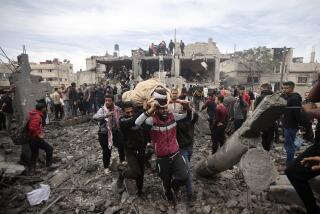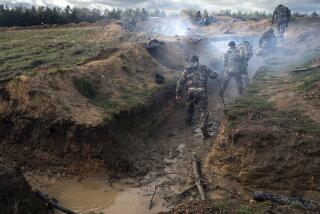Bosnian Serbs Train Big Guns on Relief Planes Over Sarajevo, U.N. Says : Balkans: Airlift is suspended. Attacks on peacekeepers continue, with French soldier slain by a sniper.
- Share via
SARAJEVO, Bosnia-Herzegovina — The weapons exclusion zone decreed around this city in February is so routinely violated now that Bosnian Serbs have been observed training antiaircraft guns on humanitarian relief planes from inside a U.N. artillery impoundment site, a U.N. spokesman conceded Friday.
The airlift of food and medicine to the Bosnian capital was suspended late Thursday after a 120-millimeter mortar round fired from another location within the exclusion zone landed on the tarmac of the U.N.-controlled airport.
In a further sign that the relative peace of the past six months has deteriorated, a French peacekeeper was shot to death Friday morning while on patrol in central Sarajevo--the first sniping casualty since last weekend’s agreement by the warring factions to cease targeting people in the streets.
The latest admissions that rebel forces have heavy weapons in offensive positions and virtual free run of U.N. weapons containment sites have made a mockery of the cease-fire proclaimed here in February. It was backed by NATO threats to launch air strikes against offending forces.
U.N. military observers reported in a confidential cable to mission headquarters that they witnessed Bosnian Serb gunmen on Wednesday manning three 40-millimeter antiaircraft guns “being trained on aircraft approaching and departing Sarajevo airport.” They described the weapons as “set up and prepared for action,” in clear violation of the weapons exclusion zone.
No U.N. soldiers were in sight of the depot in Bosnian Serb-held Ilidza, and monitors were unable to gain entrance or make contact with rebel commanders.
It was at the same weapons depot, supposedly under the watch of Ukrainian peacekeepers, that Bosnian Serb gunmen seized a tank, two armored personnel carriers and an antiaircraft gun two weeks ago.
That event prompted an air strike by North Atlantic Treaty Organization forces that destroyed a World War II-era mounted gun the rebels had also deployed into the exclusion zone.
But from within another of the 10 U.N.-monitored weapons sites, in the suburb of Bare, Bosnian Serb rebels fired on Bosnian government troops last week, confirming that many of the tanks and guns that were supposed to have been rendered inoperable in detention are combat-ready and within the rebels’ easy reach.
“The total situation is not very satisfactory,” U.N. spokesman Maj. Rob Annink said of the latest cease-fire and exclusion zone violations.
The U.N. mission wants the number of containment sites reduced and the heavy weapons consolidated for more effective monitoring, Annink said. “But this has to be negotiated,” he added, conceding that the Bosnian Serbs have refused to allow any change that would hamper access to their impounded guns.
All heavy weapons within a 12-mile radius of Sarajevo were to have been surrendered or withdrawn by Feb. 21, according to the NATO ultimatum.
But in an attempt to avoid firing on Bosnian Serb positions and compromising the neutrality of the U.N. peacekeeping force, British Lt. Gen. Michael Rose, commander of U.N. troops in Bosnia, declared more than 100 tanks, guns and other heavy weapons still inside the cordon to be under the “effective control” of his monitoring forces.
The NATO ultimatum was then further diluted by the U.N. mission here to allow Bosnian Serb rebels to “repair and maintain” weapons they were said to have surrendered but in many cases simply allowed U.N. troops to observe from nearby. That concession has allowed the rebels to gradually take over control of the weapons and restore them to working order.
A European officer at the mission command post here also conceded that a U.N.-mediated agreement aimed at tracking down and punishing snipers has not yet been put into force because Bosnian Serb gunmen refuse to grant U.N. patrols access to the high-rise apartment buildings of the Grbavica neighborhood from which the rebels are known to shelter snipers.
A 22-year-old French soldier patrolling the front line between Grbavica and downtown Sarajevo died of his wounds a few hours after being “deliberately targeted,” said another mission spokesman, Maj. Dacre Holloway. He said the location and identity of the sniper could not be determined.
More than 100 U.N. troops have been killed on duty since the mission deployed to Croatia in early 1992. It has since expanded its involvement to include Bosnia and Macedonia. More than 1,000 soldiers have been wounded.
The mounting toll and the increasing frustration with the lack of progress in negotiating an end to the conflict have stepped up pressure in European countries with troops in the Balkans to withdraw their forces and lift an arms embargo shackling the Bosnian government, effectively leaving the conflict to be resolved on the battlefield.
Meantime, Fikret Abdic, the embattled rebel Muslim leader, surrendered Friday to forces loyal to the Bosnian government in the northwest enclave of Bihac, the United Nations’ Holloway said.
Abdic, a former member of the Bosnian presidency, split with Sarajevo last year over his willingness to deal with nearby Serbs. He proclaimed the land he controlled the autonomous province of Western Bosnia. But Abdic had seen two-thirds of his fighting brigades knocked out by government troops. Earlier this week, he rejected Sarajevo’s ultimatum to surrender within a week.
More to Read
Sign up for Essential California
The most important California stories and recommendations in your inbox every morning.
You may occasionally receive promotional content from the Los Angeles Times.











